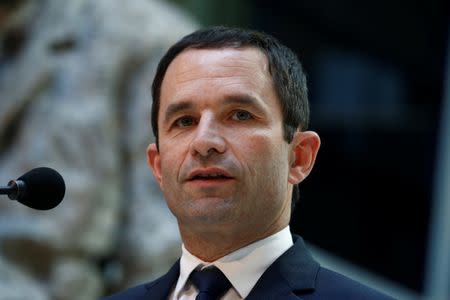French Socialists fight for life against betrayal and division
By John Irish PARIS (Reuters) - Francois Hollande's election as president in 2012 was supposed to herald a new dawn for French socialism after 17 years of right-wing rule, but by June his party could be struggling to survive. Weeks before the start of an election to pick France's next president, the ruling bloc is in tatters. Socialist Party (PS) nominee Benoit Hamon is floundering after adopting a hard-left programme that alienated more moderate colleagues. Polls put Hamon in a humiliating fifth place, behind the independent leftist Jean-Luc Melenchon whose charisma and similarly radical programme have overshadowed Hamon's message. Party grandees, meanwhile, are jumping ship to back independent centrist Emmanuel Macron, Hollande's former economy minister who is now favourite to win the presidency. Macron is more palatable to party moderates who see Hamon's policies as outdated and resent his refusal to defend the president's legacy. "The future is very uncertain. The Socialist party must negotiate its transformation for its survival," said Adelaide Zulfikarpasic of pollster BVA. The potential implosion of the Socialist party weakens France's two-party system that has been in place for 30 years and has prevented the far right from increasing its power in presidential and legislative elections. Like in Britain, it also risks leaving the main left-wing party in opposition for years as it takes a radical turn, reinforcing an anti-European side on the left. If Macron were to fail, it would be unclear what would happen to the centre-left at a time when France's traditional centre-right is increasingly radicalised and could also be in disarray should its candidate, Francois Fillon, also fail to reach the May 7 run-off. In 2002, outgoing Socialist prime minister Lionel Jospin was beaten to the presidential runoff by then far-right leader Jean-Marie Le Pen. The party potentially faces an even bloodier defeat this time. Their disarray reflects the wider struggle of Europe's left where leaders in Italy and Germany have fallen on their swords and the British Labour Party is riven by infighting. Some French Socialist lawmakers say in private that their aim now is to limit the damage in the presidential vote so as to build a foundation for the legislative elections in June. A vote above 10 percent for Hamon could help save seats, creating a platform for a say in a Macron parliamentary majority, but some kind of party split looks likely. "I think that after the elections, the Socialists will implode into the 'reformed Socialists' who could be part of a governing majority and the 'status quo Socialists'," a minister in the current government told Reuters. This split has its roots in Hollande's five years in power, when he moved away from pro-worker election pledges to launch business-friendly reforms. Their failure to spur the economy emboldened rebels such as Hamon and further alienated voters. Stinging defeats in local elections followed, and party membership has almost halved since 2012. As a result, and despite having a majority in both parliamentary houses, Hollande became the first postwar French president not to seek re-election. STABBED IN THE BACK "I respect Benoit Hamon's logic, which has always existed on the Left - a utopian project - but it's clear that implementing such a project does not correspond to reality and a capacity to act," said Defence Minister Jean Yves-Le Drian, a Socialist party heavyweight, who last week backed Macron. Some 50 other Socialist lawmakers have turned to Macron's newly-formed En Marche! (Onwards!) movement, defections that Hamon calls a "betrayal". Meanwhile, former prime minister Manuel Valls, who lost to Hamon in the primaries and is seen as waiting in the wings to pick up the pieces after the presidential race, has been scathing about the former education minister. Hamon signed a motion of no-confidence against Valls' government last year. "Those who join Emmanuel Macron, and are stabbing me in the back, are not those who gave me life ... Those are the 2 million voters," Hamon told France 2 television on Sunday, referring to the turnout for the January Socialist primaries. "Anyway I would never have governed with them." Macron's momentum ahead of the April-May vote will be key for how the Socialists shape up in the coming years. His movement says it bridges France's left-right divide, and although the race remains tight and voters unsure, polls show that Macron should easily beat National Front leader Marine Le Pen - daughter of Jean-Marie - in the run-off. "If this central scenario materialises, there will be less reason for parties to stick together," said Eurasia analyst Charles Lichfield. "This is especially likely on the left, as the PS is likely to do very badly. Expressing some proximity to Macron may be a way for 100-150 PS members of parliament to save their seats." Even uniting the left into opposition will be hard, given that Melenchon offers a clean break from the tarnished Socialists. The one-time Trotskyist and former teacher who quit the party in 2008 has sucked away the hard left vote with calls to fight the rich and powerful, asking PS supporters: "In these conditions, without a project or electoral advantage, what is the point of a Socialist candidate?" (Additional reporting by Marine Pennetier and Emile Picy; Editing by Andrew Callus and Robin Pomeroy)

 Yahoo News
Yahoo News 

